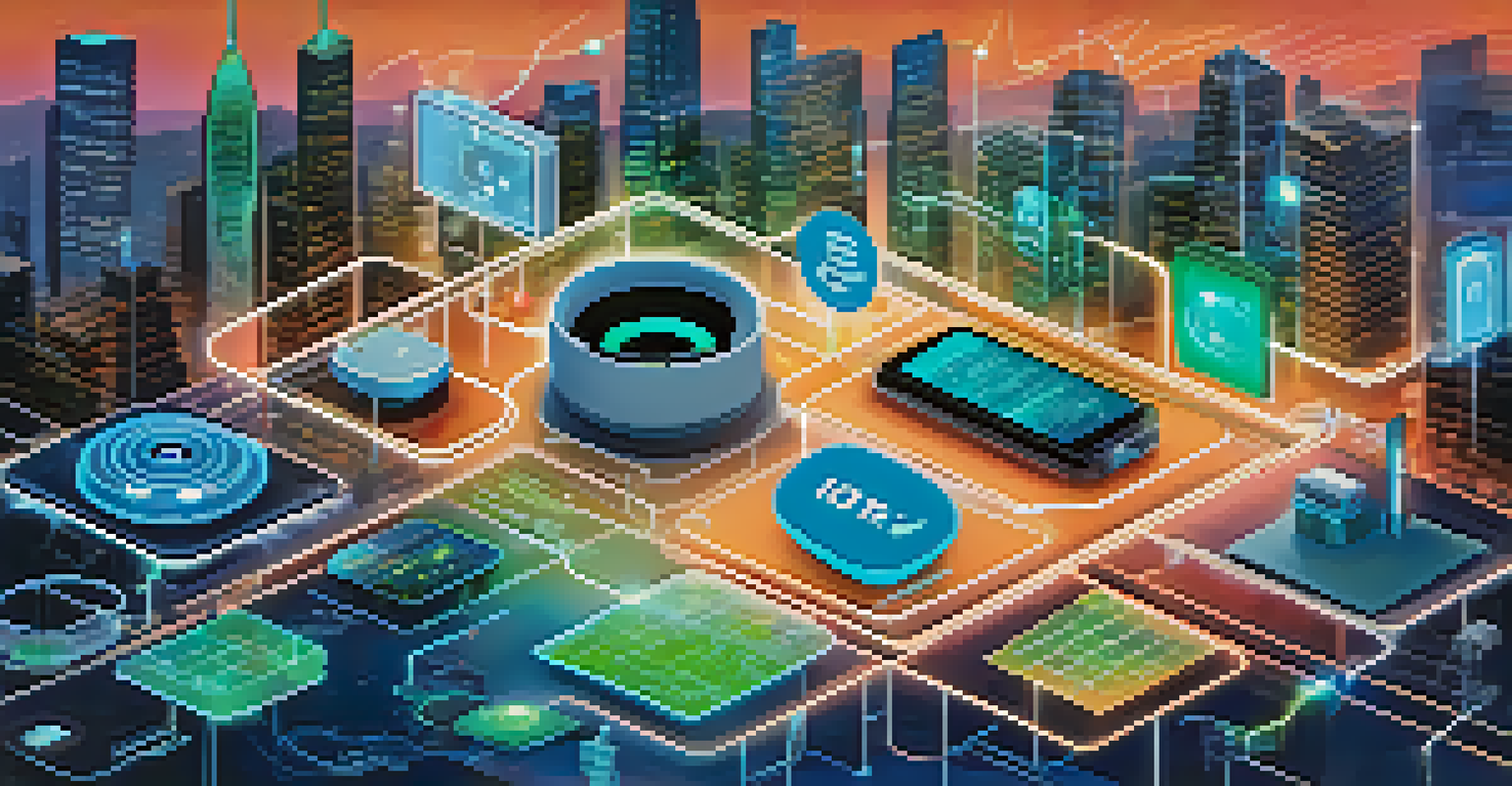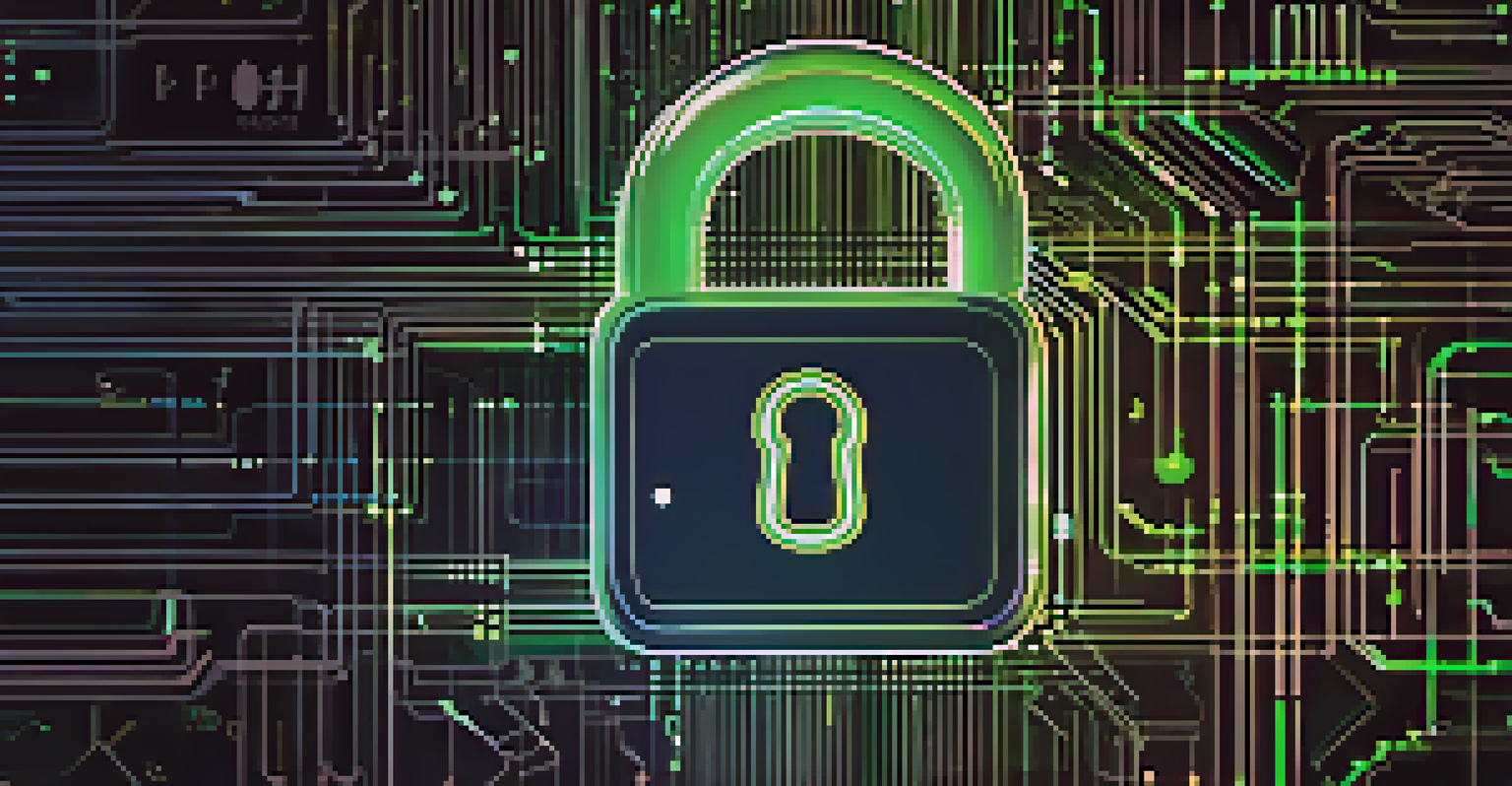Investigating IoT Devices: Unique Challenges in Digital Forensics

Understanding IoT Devices and Their Importance
The Internet of Things (IoT) refers to a network of interconnected devices that communicate and exchange data. These devices range from smart home gadgets like thermostats and security cameras to industrial sensors used in manufacturing. As IoT devices proliferate, they become integral to our daily lives, making their security and data integrity paramount.
The Internet of Things is not a concept; it is a network of real-world devices that communicate with each other to create meaningful insights.
The significance of IoT devices extends beyond convenience; they often collect sensitive information about individuals and organizations. This data can be invaluable in both personal and corporate settings, making IoT devices prime targets for cybercriminals. As such, understanding these devices is essential for anyone involved in digital forensics.
In the realm of digital forensics, the ability to investigate and analyze data from IoT devices can provide crucial insights during investigations. However, this task is fraught with challenges, which we will explore in the following sections.
Challenges of Data Acquisition from IoT Devices
One of the first hurdles in digital forensics is data acquisition, especially with IoT devices. Many of these devices store data in the cloud or transmit it in real-time, complicating the process of obtaining evidence. Unlike traditional computers, where data can often be extracted directly, IoT devices may require access to multiple systems for complete data retrieval.

Moreover, the proprietary nature of many IoT devices can make data extraction even trickier. Manufacturers may not provide sufficient documentation or tools, leaving forensic investigators to navigate uncharted waters. This often leads to a reliance on trial and error, which can be time-consuming and may result in data loss.
Data Acquisition Challenges
Obtaining evidence from IoT devices is complicated due to data being stored in the cloud and the proprietary nature of many devices.
Additionally, the sheer volume of data generated by IoT devices can overwhelm forensic teams. Sifting through terabytes of sensor data or video footage to find relevant information requires advanced tools and a clear strategy, emphasizing the complexity of investigations.
Diverse Data Formats and Standards in IoT
IoT devices come in a wide variety of types and configurations, each potentially using different data formats and communication protocols. This diversity can pose significant challenges in forensic investigations as investigators must be familiar with various standards to effectively analyze the data. For example, a smart thermostat may store data differently than a wearable fitness tracker.
As we integrate more devices into our lives, the importance of securing these devices cannot be overstated.
The lack of standardized data formats means that investigators may need to develop custom solutions for each device. This can lead to inconsistencies in how data is interpreted and reported, complicating the overall investigative process. Moreover, the absence of universal guidelines for IoT forensics can hinder collaboration between agencies and organizations.
To navigate this challenge, forensic experts often have to engage in continuous learning and adapt to new technologies. Staying current with emerging trends and tools is crucial for effectively handling the diverse landscape of IoT devices.
The Role of Encryption and Security Measures
As security threats continue to evolve, many IoT devices now employ encryption to protect sensitive data. While this can enhance security, it also presents a significant obstacle for forensic investigators trying to access crucial information. Without the proper keys or access, encrypted data can remain locked away, rendering it useless in an investigation.
Furthermore, many IoT manufacturers prioritize user privacy, often implementing robust security measures that complicate data access. This can include not only encryption but also multi-factor authentication and cloud storage solutions that are difficult to penetrate. Investigators may find themselves limited in their ability to retrieve and analyze data, impacting the timeline and outcome of their investigations.
Legal and Ethical Considerations
IoT forensics involves navigating complex legal regulations and ethical dilemmas regarding user privacy and consent.
To overcome these challenges, investigators must work closely with cybersecurity experts to explore potential avenues for decrypting or accessing secured data. This collaboration can lead to innovative solutions, but it also highlights the ongoing tug-of-war between security and accessibility.
Legal and Ethical Implications of IoT Forensics
Investigating IoT devices raises unique legal and ethical questions that forensic experts must navigate. Data privacy laws vary by region, influencing how investigators can access and use data from these devices. For instance, what may be permissible in one jurisdiction could lead to legal repercussions in another, complicating investigations that cross borders.
Moreover, ethical considerations around user consent and data ownership come into play. Forensic investigators must balance the need for evidence with respect for individual privacy rights. This can create a moral dilemma, particularly when personal data is involved, and raises questions about the extent to which data can be used in a legal context.
It is crucial for forensic professionals to stay informed about legal frameworks and ethical guidelines relevant to IoT investigations. This knowledge not only aids in compliance but also fosters trust with the public, enhancing the credibility of forensic practices.
The Need for Specialized Forensic Tools
Given the unique challenges posed by IoT devices, the demand for specialized forensic tools has never been greater. Traditional forensic tools may fall short when it comes to extracting and analyzing data from these devices. As a result, new software and hardware solutions are being developed specifically for IoT forensics.
These specialized tools are designed to handle the diverse data formats and protocols used by IoT devices, streamlining the forensic process. They can automate data acquisition and analysis, making it easier for investigators to focus on interpreting the findings rather than getting bogged down by technical details.
Need for Specialized Tools
The unique characteristics of IoT devices necessitate the development of specialized forensic tools to effectively extract and analyze data.
As the IoT landscape continues to evolve, so too must the tools and techniques used in digital forensics. Continuous innovation in this space is essential to keep pace with emerging technologies and the associated challenges they bring.
Training and Collaboration for Effective IoT Forensics
To tackle the complexities of IoT forensics, ongoing training and collaboration are essential. Forensic professionals must regularly update their skills to keep up with the rapid advancements in technology. This includes understanding new devices, data formats, and security measures that can significantly impact investigations.
Collaboration between law enforcement, cybersecurity experts, and industry professionals can also enhance the effectiveness of IoT investigations. By sharing knowledge and resources, these groups can develop best practices and techniques that can be applied across different cases, ultimately leading to more successful outcomes.

Establishing forums and workshops dedicated to IoT forensics can foster a culture of continuous learning and improvement. As investigators exchange ideas and experiences, they can better equip themselves to face the unique challenges presented by IoT devices.